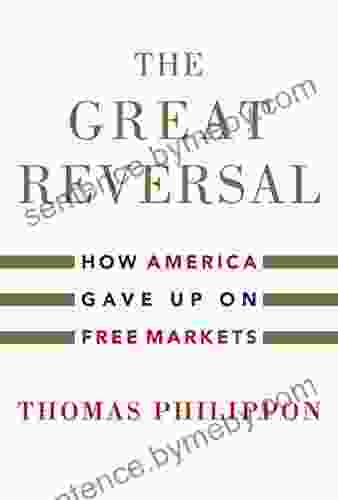How America Gave Up on Free Markets: An Eye-Opening Look at the Rise of Crony Capitalism

In her new book, How America Gave Up on Free Markets, investigative journalist Bethany McLean tells the inside story of how America's free-market economy has been corrupted by crony capitalism.
4.5 out of 5
| Language | : | English |
| File size | : | 19505 KB |
| Text-to-Speech | : | Enabled |
| Screen Reader | : | Supported |
| Enhanced typesetting | : | Enabled |
| X-Ray | : | Enabled |
| Word Wise | : | Enabled |
| Print length | : | 344 pages |
McLean shows how big businesses have used their power to rig the system in their favor, and how government policies have made it easier for them to do so. The result is an economy that is increasingly unfair, unequal, and inefficient.
McLean's book is a must-read for anyone who wants to understand the challenges facing the American economy. It is a deeply reported and well-written account of how crony capitalism has taken hold in America, and what can be done to stop it.
The Rise of Crony Capitalism
Crony capitalism is a system in which businesses use their political connections to gain advantages over their competitors. This can take many forms, such as lobbying for favorable legislation, bribing government officials, or using their monopoly power to stifle competition.
Crony capitalism is not a new phenomenon. It has been around for centuries, and it has been practiced in every country in the world. However, it has become increasingly prevalent in the United States in recent decades.
There are a number of factors that have contributed to the rise of crony capitalism in America. One is the increasing concentration of wealth and power in the hands of a few large corporations. These corporations have used their resources to lobby for laws that benefit them and to buy influence in Washington.
Another factor that has contributed to the rise of crony capitalism is the decline of unions. Unions have traditionally been a counterweight to corporate power. However, the decline of unions has made it easier for businesses to rig the system in their favor.
Finally, the rise of crony capitalism has been aided by a lack of public awareness. Many Americans are unaware of the extent to which crony capitalism has taken hold in their country. This is due in part to the fact that the media has largely ignored the issue.
The Costs of Crony Capitalism
Crony capitalism has a number of negative consequences for society. It leads to higher prices, lower wages, and less innovation. It also undermines the rule of law and erodes public trust in government.
One of the most visible costs of crony capitalism is higher prices. When businesses use their political connections to gain advantages over their competitors, they can charge higher prices for their products and services. This is because they know that their competitors will not be able to compete on a level playing field.
Another cost of crony capitalism is lower wages. When businesses use their political connections to reduce competition, they can also drive down wages. This is because they know that their workers will not be able to find better jobs elsewhere.
Crony capitalism also stifles innovation. When businesses know that they can use their political connections to gain an advantage, they are less likely to invest in new products and services. This is because they know that they can make more money by lobbying for favorable legislation or bribing government officials.
Finally, crony capitalism undermines the rule of law and erodes public trust in government. When people see that businesses can use their political connections to get what they want, they lose faith in the fairness of the system. This can lead to social unrest and political instability.
What Can Be Done?
There are a number of things that can be done to stop crony capitalism. One is to strengthen antitrust laws. Antitrust laws are designed to prevent businesses from using their monopoly power to stifle competition. However, these laws have been weakened in recent decades, and they need to be strengthened again.
Another way to stop crony capitalism is to increase public awareness of the issue. Many Americans are unaware of the extent to which crony capitalism has taken hold in their country. This is due in part to the fact that the media has largely ignored the issue. However, there are a number of ways to increase public awareness of crony capitalism, such as through social media and public education campaigns.
Finally, we need to elect politicians who are committed to fighting crony capitalism. We need politicians who will stand up to corporate power and who will work to level the playing field for all businesses.
Crony capitalism is a serious threat to the American economy and to our democracy. It is a system that is unfair, unequal, and inefficient. It is a system that undermines the rule of law and erodes public trust in government.
However, there are a number of things that can be done to stop crony capitalism. We need to strengthen antitrust laws, increase public awareness of the issue, and elect politicians who are committed to fighting corporate power.
Together, we can create a more just and equitable economy for all Americans.
4.5 out of 5
| Language | : | English |
| File size | : | 19505 KB |
| Text-to-Speech | : | Enabled |
| Screen Reader | : | Supported |
| Enhanced typesetting | : | Enabled |
| X-Ray | : | Enabled |
| Word Wise | : | Enabled |
| Print length | : | 344 pages |
Do you want to contribute by writing guest posts on this blog?
Please contact us and send us a resume of previous articles that you have written.
 Book
Book Novel
Novel Page
Page Chapter
Chapter Text
Text Story
Story Genre
Genre Reader
Reader Library
Library Paperback
Paperback E-book
E-book Magazine
Magazine Newspaper
Newspaper Paragraph
Paragraph Sentence
Sentence Bookmark
Bookmark Shelf
Shelf Glossary
Glossary Bibliography
Bibliography Foreword
Foreword Preface
Preface Synopsis
Synopsis Annotation
Annotation Footnote
Footnote Manuscript
Manuscript Scroll
Scroll Codex
Codex Tome
Tome Bestseller
Bestseller Classics
Classics Library card
Library card Narrative
Narrative Biography
Biography Autobiography
Autobiography Memoir
Memoir Reference
Reference Encyclopedia
Encyclopedia Margaret Jean Langstaff
Margaret Jean Langstaff James Oseland
James Oseland Janet Stevens
Janet Stevens Judy Bell
Judy Bell James Littlejohn
James Littlejohn Jason E Portnof
Jason E Portnof Jianfu Shen
Jianfu Shen Jann Wenner
Jann Wenner Janine Urbaniak Reid
Janine Urbaniak Reid James Renner
James Renner Quad Webb
Quad Webb James Hunter
James Hunter Todd Michael St Pierre
Todd Michael St Pierre Sharon Robinson
Sharon Robinson Jana K Lipman
Jana K Lipman Jayla Joseph
Jayla Joseph Paul Harris
Paul Harris Kel Carpenter
Kel Carpenter Max Muller
Max Muller Miko Flohr
Miko Flohr
Light bulbAdvertise smarter! Our strategic ad space ensures maximum exposure. Reserve your spot today!

 Christian CarterExplore the Complexities of Stagflation: An In-Depth Guide for Understanding...
Christian CarterExplore the Complexities of Stagflation: An In-Depth Guide for Understanding...
 Kevin TurnerUnleash the Killer Instinct: An Unforgettable Journey with James Patterson's...
Kevin TurnerUnleash the Killer Instinct: An Unforgettable Journey with James Patterson's... Henry JamesFollow ·8.7k
Henry JamesFollow ·8.7k Anthony WellsFollow ·17.5k
Anthony WellsFollow ·17.5k Ian PowellFollow ·7.8k
Ian PowellFollow ·7.8k John GrishamFollow ·15.4k
John GrishamFollow ·15.4k Chinua AchebeFollow ·17.3k
Chinua AchebeFollow ·17.3k Dean CoxFollow ·18k
Dean CoxFollow ·18k Jerry WardFollow ·5.6k
Jerry WardFollow ·5.6k Dan HendersonFollow ·10.6k
Dan HendersonFollow ·10.6k

 Franklin Bell
Franklin BellHow Businesses Can Thrive In The New Global Neighborhoods
The world is becoming...

 Rob Foster
Rob FosterCard Manipulations Volume 1: A Masterclass in Deception...
Unveiling the...

 Enrique Blair
Enrique BlairUnveil the Secrets of Card Manipulation: Dive into "More...
Step into the captivating world...

 Jamal Blair
Jamal BlairComedy Fillers 200 Quips One Liners Jean Hugard
Unlock the Secrets of...

 Chase Simmons
Chase SimmonsUnlock Financial Independence: A Comprehensive Guide to...
In a world where financial security seems...

 Dion Reed
Dion ReedUnveiling Global Market Entry Strategies: A Comprehensive...
Global Market Entry Strategies:...
4.5 out of 5
| Language | : | English |
| File size | : | 19505 KB |
| Text-to-Speech | : | Enabled |
| Screen Reader | : | Supported |
| Enhanced typesetting | : | Enabled |
| X-Ray | : | Enabled |
| Word Wise | : | Enabled |
| Print length | : | 344 pages |







